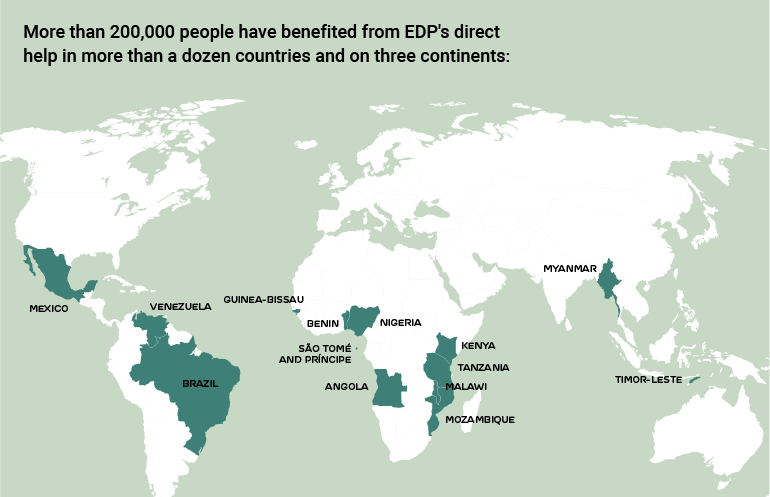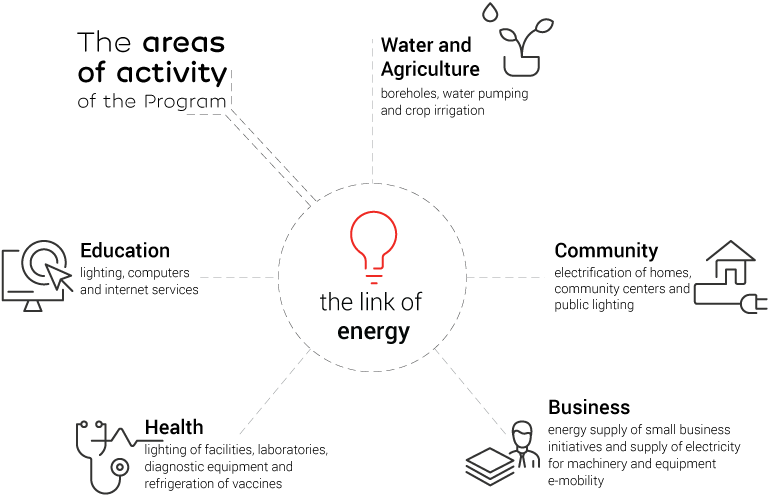We bring energy to those who do not have it yet
It is not a mere idea or a commitment that only applies in those countries where EDP operates. It is a mission we have been pursuing for many years - to support communities and countries where securing a steady, safe energy supply is not an easy goal.
Before UN Sustainable Development Goals were announced in 2015, or even before the creation of the SEforALL organization, in which EDP is deeply involved, we had already launched - back in 2009 - the A2E (Access to Energy) program. And more recently we have created the A2E Fund, which is now in its third edition. .
It was at Kakuma Refugee Camp, Kenya, that EDP helped install solar panels for lighting, heating, and water purification/heating, among other energy efficiency strategies. Always in partnership with the UN - through the High Commissioner for Refugees, then headed by António Guterres -, the initiative at Kakuma Camp has made it possible to improve the living conditions of thousands of people.
More than 200,000 people aided by A2E
Ever since that first initiative, more than 200,000 people have benefited directly from the support of EDP, which has implemented energy-related humanitarian projects in more than a dozen countries across three continents:

If in addition to humanitarian initiatives we include international investment in companies, start-ups and projects focusing on renewable energies and energy efficiency - through EDP Renováveis, which has been coordinating A2E since 2018 -, we will see that the program has improved the lives of more than 200,000 people over the last three years alone. €6 million invested in businesses through A2E.
A good example of this is the purchase of a stake in Bangladeshi start-up SOLshare, which creates and manages electrical microgrids - one of the best solutions for remote communities and regions where it is difficult to secure conventional energy access. SOLshare was created by German entrepreneur Sebastian Groh, who took an interest in the widespread use of domestic solar energy in Bangladesh. He chose the country for a post-graduate course in micro-energy and decided to stay there, as he explained in a recent interview with EDP.
A2E Fund with a special focus on Africa
Most people with no access to electricity live in Africa, and it is also in Africa that EDP's philanthropic initiatives have been the most active, supporting communities, institutions and projects that combine access to energy with health, education, gender equality, and equal opportunities.
Created in 2018 and with an annual budget of €500,000, the A2E Fund is now in its third edition. This year the program will focus on Malawi, Mozambique and Angola, countries that have had projects in previous editions, but also on Angola and Rwanda, where the fund will invest for the first time.
The A2E Fund covers five major areas in which energy can make a decisive contribution: Health, Water, Agriculture, Business, and Community. Projects are selected according to criteria such as their social impact, partnerships, sustainability, scalability potential, and number of beneficiaries. Granted funds range from €25,000 to €100,000.

Increased support during the pandemic
EDP's aid goes well beyond existing programs. We are attentive, committed, and ready to act whenever necessary, as we have shown last year amid the Covid-19 pandemic. In 2020, following previous investments in SolarWorks! (Mozambique) and Rensource (Nigeria), EDP decided to support two local projects through these two companies.
In Mozambique, SolarWorks! delivered 35 solar-powered sewing machines (gifted by EDP) to the Salesians congregation. These machines were then used to manufacture protective masks in order to prevent the transmission of the virus. Also, portable radios were distributed so that local communities could learn more about preventive measures against Covid-19. In Nigeria, Rensource took on the task of distributing hygiene, disinfection and protective equipment among its workers, as well as in local markets and hospitals, to contain the spread of the virus.
EDP Group has invested €25,000 in these two initiatives as part of an extended program to mitigate the effects of the pandemic in all the regions where it operates.
EDP with partnerships that change the world
Access to Energy is a very important issue within EDP Group. In March 2021 EDP Renováveis became a member of the RES4Africa Foundation, together with Schneider Electric and Vestas. The three companies had already partnered with the foundation through renewAfrica, an initiative designed to attract European investors to the African market through renewable energies.
As part of SEforALL, in addition to the institutional partnership, EDP contributes to specific projects in which this organization is involved. An example of this is High Level Impact Opportunities, a platform designed to find locations and contexts where the energy transition process could be easier and/or offer more direct results. EDP is very active on this SEforALL platform, creating 'renewable energy minigrids'. With its expertise and concrete solutions in the field of renewable energy, EDP contributes - together with other members - to setting up action plans for energy access projects in remote regions all over the world.
A EDP Renováveis is also a member of the Alliance for Rural Electrification, which is committed to driving access to renewable energies in remote communities and developing countries. EDP Renováveis is one of the +175 members of this multinational platform, which brings together large and small energy companies from various areas, as well as banks, NGOs, and state institutions. The goal is both to provide support/consultancy services and to create partnerships in which the people in charge of a particular project can find the most appropriate companies and solutions to implement it. Always with energy access in remote areas as the top priority.
Energy access difficulties in certain regions - especially in Africa - can now become excellent development opportunities at various levels. Thanks to the constant evolution of renewable energies, those clean technologies can be implemented more easily, thus avoiding the use of polluting energies - for the benefit of local communities, local economies, and the planet. And that is also one of the major missions of a leader in the renewable energy industry such as EDP.